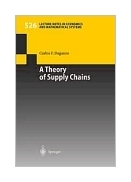|
||
• wydawnictwa polskie
• Zamów informacje o nowościach z wybranego tematu • kontakt
• Cookies na stronie |
A THEORY OF SUPPLY CHAINS. LECTURE NOTES IN ECONOMICS AND MATH SYSTEMSDAGANZO Cwydawnictwo: SPRINGER , rok wydania 2003, wydanie Icena netto: This book summarizes a set of lectures given at U.C. Berkeley in the Fall of 2001, highlighting the connection between traffic flow, queuing systems and supply chains. The book unveils the root causes of the "bullwhip" effect; i.e., where the production of raw materials in a supply chain is seen to be more volatile than that of intermediate goods, and even more so than the final customer demand. It also shows that this indesirable effect arises if suppliers act in a certain non-cooperative way, even if they have perfect information about the future. Their actions, just as importantly as what they know, determine the stability of a supply chain. The book then describes control methods for eliminating all instabilities without increasing supplier costs, and presents approximate cost formulas. It also shows that for every supply chain, there is a dual queuing system with identical behavior, and that queuing systems can be similary controled. Contents Introduction Algorithms/Policies Algorithmic Properties Stability and Monotonicity Requirements Strongly Stable Policies: The Act Method Cost Estimation and Optimization Discussion References Appendix A: Stability via Control Theory Appendix B: Kinematic Wave Theory Revisited 123 pages Księgarnia nie działa. Nie odpowiadamy na pytania i nie realizujemy zamówien. Do odwolania !. |


